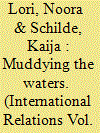|
|
|
Sort Order |
|
|
|
Items / Page
|
|
|
|
|
|
|
| Srl | Item |
| 1 |
ID:
168428


|
|
|
|
|
| Summary/Abstract |
Budgetary cuts are characterized by distinct political, organizational, and psychological dynamics in contrast to increases. Ideally, policymakers rank, prioritize, and assess among likely strategic challenges to identify the appropriate offices, programs, line items, or service branches in which to curtail spending. Targeted cuts—preserving some line items or services while cutting others—occurred during the Eisenhower, Kennedy, Ford, and Clinton administrations. In contrast, the Nixon, H.W. Bush, and Obama administrations implemented across-the-board cuts, impacting all areas of the budget uniformly, regardless of strategic priorities. We argue that the ability of the executive to target and redirect spending commensurate with national security needs are constrained by domestic interests. However, the degree to which the threat environment is diverse conditions the number of available policy options and, in turn, executive capacity to implement targeted cuts vis-à-vis parochial interests.
|
|
|
|
|
|
|
|
|
|
|
|
|
|
|
|
| 2 |
ID:
181173


|
|
|
|
|
| Summary/Abstract |
Advanced liberal democratic states interdict migrants on the High Seas global commons. Why have liberal states engaged in this practice over the past four decades? Deterrence and humanitarian rescue explain part of this puzzle, but they are insufficient for understanding the patterns and justifications for migrant interdiction on the High Seas. Tension between states promoting international human rights and circumventing those obligations challenges expectations of liberal state behavior. International relations scholars must incorporate the global commons when explaining state behavior; ungoverned areas create exceptional zones for states to partially suspend their standard operating procedures to execute policies furthering their interests. We argue that liberal states use the regulatory gray zones of the High Seas to ‘muddy the waters’ in order to advance their security interests. States with the highest domestic refugee protections have incentives to circumvent their own obligations, which vary over time with changes to domestic asylum laws.
|
|
|
|
|
|
|
|
|
|
|
|
|
|
|
|
|
|
|
|
|